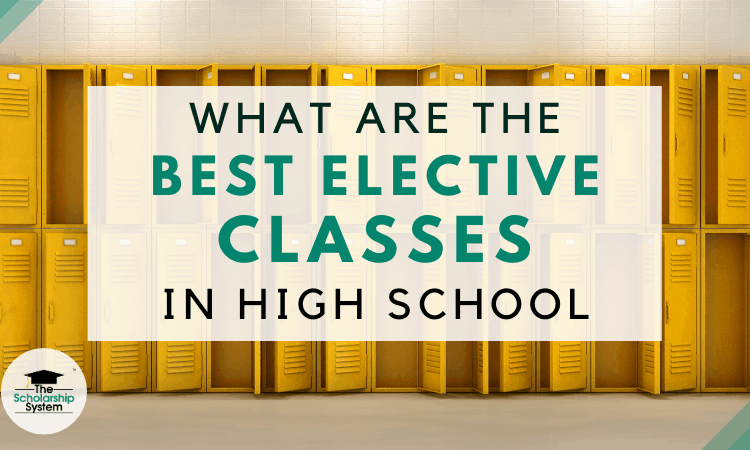Updated on July 29th, 2024
Overall, high school students have only a handful of opportunities to customize their educational experience. The majority of the high school classes they take are required for graduation. Elective classes are the exception, allowing your student to choose high school electives and handpick part of their curriculum based on their personal interests, academic goals, or nearly any other criteria.
While it may seem like which elective classes your student chooses aren’t overly important, that isn’t always the case. Some elective courses in high school set students up for additional success. They may make it easier to get into college or to excel once they get there. In some cases, elective classes in high school might even pave the way toward scholarships, increasing the odds that your student can graduate debt-free.
Classes students choose can help them find independence, explore their passions, and develop personal interests.
If you and your student want to learn more about finding scholarships, sign up for our free college scholarship webinar! Take a moment and head over to http://thescholarshipsystem.com/freewebinar to reserve your spot today.
Contents
What Are Elective Classes?
In high school, elective classes are any course that doesn’t align with the traditional, mandatory curriculum. Taking the class is considered completely optional. If the class isn’t one of the must-take math, science, English, language arts, history, PE, or similar courses, it is likely an elective.
Elective classes in high school give students some freedom. At times, students choose courses not based on their potential for academic enrichment, but because they are viewed as easy. While not having an overly strenuous high school experience isn’t a bad thing, as too much stress can be harmful, using that criteria alone to choose electives may not be wise.
The best electives to take in high school offer more than a few credits on a transcript. For example, they may allow your student to acquire or develop a useful skill, one that could set them up for future academic or professional success. Similarly, they might enable your student to explore an area they may otherwise miss, making them solid introductions to subjects they may want to pursue in college.
The Value of Elective Courses in High School
Elective classes give a high school student a chance to delve into subjects outside of the standard curriculum. That can make the experience valuable and enriching, especially when the courses are selected with care. It’s important not to overload their schedules with too many core classes and to strike a balance with elective courses.
Through an elective, your student may be able to develop a skill or explore a potential professional interest. They can learn more about their capabilities as well as what subjects keep them engaged, all of which can help them determine the best path for their future.
In some cases, electives can help a student enhance their academic record in a way that supports their existing college goals. For example, if your student is interested in earning a STEM degree (and landing STEM scholarships), they can use their elective slots for diving deeper into math and science, allowing them to go above and beyond the graduation requirements.
Elective classes can also introduce your students to aspects of the world and the human experience they may otherwise overlook. Electives like psychology, sociology, and economics can be eye-opening.
Finally, elective classes in high school can also let students inject a bit of fun into their schedules. While their overall course load should still be robust, taking an interesting elective can boost engagement, reduce stress, and potentially build useful skills.
What Are the Best Electives to Take in High School?
Usually, the best electives to take in high school are courses that enhance the academic experience and set your student up for future success. For example, taking electives related to one’s academic focus, such as computer programming, can demonstrate passion, dedication, and relevant skills to colleges. By taking the class, your student may have an easier time excelling in college. Electives like creative writing can develop critical and creative thinking skills, valuable in both academic and workplace settings. In some cases, they may be able to test out (such as by completing AP exams) of certain classes, allowing them to graduate sooner and reduce the financial burden of going to college. High school elective courses, including foreign languages, offer students a chance to explore various interests and potential career paths.
Here’s a look at some of the elective courses in high school that are worth considering.
Foreign Languages
If your student’s school doesn’t require foreign language classes to graduate (or only requires one or two years of credits), diving into one is a smart move. Many college programs require foreign language courses. In fact, some colleges and universities make them mandatory for all Bachelor’s of Arts degrees, regardless of the selected major.
Plus, knowing a second language can help your student professionally. Some jobs offer salary premiums to bilingual employees, for example. At other times, having foreign language skills may be required if your student wants to land a particular job.
Additionally, these classes do more than just teach your student to speak a foreign language; they also introduce them to another culture and country. It can be an enriching experience, one that may broaden their mind and horizons.
Personal Finance
The vast majority of high schools do little to prepare students to manage their finances once they are out on their own. By taking a personal finance elective, your student can learn the intricacies of managing bank accounts and the ramifications of various kinds of debt.
Additionally, they’ll learn critical concepts like the impact of interest rates, both when associated with savings and when associated with debts. They can learn why saving for retirement early is wise, as well as the steps it takes to achieve and maintain a great credit score.
Personal finance skills are valuable. If your student needs to learn the fundamentals, this is a must-take elective.
Computer Science
We live in a technology-driven society. Even if your student isn’t pursuing a technology-oriented degree, they will encounter tech on the job. As a result, taking a computer science or similar elective can be a good choice for any student, allowing them to increase their comfort level and acquire skills that can help them professionally.
Public Speaking
If your student isn’t an eloquent (or, at least, semi-comfortable) speaker, then public speaking is a great elective to choose. Many people freeze when they have to present information to a group, something that many professionals have to do with surprising regularity.
By taking public speaking, your student can learn skills that will prove valuable. Along with discovering the ins and outs of creating presentations, they’ll gather insights and techniques that can make delivering that information to others feel easier.
Business/Professional Writing
Even if your student’s future profession won’t involve writing an endless number of reports, it’s guaranteed they’ll have to handle some business writing on occasion. Whether it’s an informative, professional email, a career-boosting resume, and cover letter, or, yes, the occasional report, knowing how these documents go together is vital to their success.
Something Fun and Active
While most high schools require a PE course or two, many students don’t have to take one every year. But staying active is vital for good health, and it can reduce stress. That’s why a fun but active elective class can be a great addition to your student’s schedule.
Ideally, your student should choose an option they enjoy. That way, working out isn’t a slog; it’s a rejuvenating experience instead.
Frequently Asked Questions
What is the best elective to take in high school?
Choosing the best elective in high school depends on your interests, goals, and plans. If you’re passionate about the arts, you might find classes like music, drama, or visual arts highly rewarding and provide a creative outlet. For those interested in technology, computer science, coding, or robotics, electives can offer valuable skills and open doors to exciting careers. If you’re leaning towards a business career, courses in economics, entrepreneurship, or marketing might be beneficial. Electives in foreign languages, psychology, or environmental science can broaden your horizons and enhance your college applications. Ultimately, the best elective is one that aligns with your passions and helps you explore potential career paths. Choose what excites you and supports your long-term goals.
What are the easiest electives in high school?
The easiest electives in high school can vary. Still, some commonly considered easy options include art classes, such as drawing, painting, or ceramics, which are often seen as enjoyable and stress-relieving. Physical education classes, including general gym or dance, are generally less academically demanding. Music appreciation classes, where students learn about different genres and music history without needing to play an instrument, can be engaging and low-pressure. Lastly, basic computer skills courses, like introductory classes in computer applications and typing, are often straightforward for most students.
What is the most useful class in high school?
The most useful elective, again, depends on what you want to focus on in college. A computer science or programming elective can be valuable for developing tech skills and logical thinking. Business or entrepreneurship courses offer insights into managing finances and marketing, which can be helpful for future business endeavors. Public speaking or debate classes improve communication skills and confidence, which are beneficial across many careers. Creative writing can enhance your writing skills and creativity and is helpful in fields like journalism and marketing. Additionally, finance or accounting electives teach practical financial skills applicable in personal and professional contexts. Choosing an elective that aligns with your interests and future goals will benefit you most.
Do colleges look at elective grades?
Colleges look at elective grades as part of their admissions review process. While core subjects like math, science, and English are typically weighted more heavily, electives can still provide valuable insight into a student’s interests, skills, and overall academic performance. Strong grades in electives related to a student’s intended major or areas of interest can positively impact their application.
If you and your student want to learn more about finding scholarships, sign up for our free college scholarship webinar! Take a moment and head over to http://thescholarshipsystem.com/freewebinar to reserve your spot today.








Great list of elective classes! I never thought about how much they could impact my future. I’m especially interested in the coding and creative writing options. Thanks for sharing!